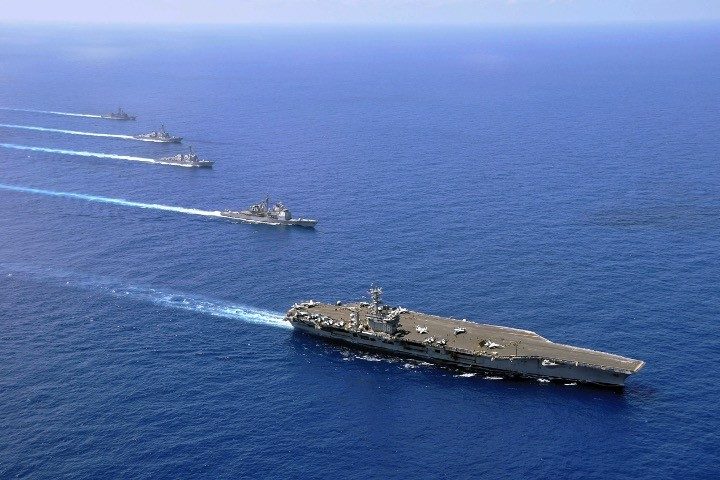
At least three of several islands in the disputed South China Sea have been fully militarized by Communist China, according to a top U.S. military commander.
U.S. Indo-Pacific commander Adm. John C. Aquilino told the Associated Press that all nations in the vicinity are threatened by China’s aggressions, which include arming the islands in question with anti-ship and anti-aircraft missile systems, laser and jamming equipment, and fighter jets.
Aquilino, who leads the largest U.S. combatant command with 380,000 military and civilian personnel covering 36 nations and territories, noted that the moves are in contrast to previous assurances by Chinese President Xi Jinping his country would not turn the artificial islands on contested waters into military bases, and maintained that China is flexing its military muscle.
“I think over the past 20 years we’ve witnessed the largest military buildup since World War II by the PRC [People’s Republic of China],” said Aquilino. “They have advanced all their capabilities and that buildup of weaponization is destabilizing to the region.”
Beijing, meanwhile, contends that its moves are merely defensive measures to protect its sovereign rights. The regime has increased its military spending over the years and now has the second-largest military budget in the world, after the United States. This comes as China has sought to modernize its forces with weapons systems like the J-20 stealth fighter, hypersonic missiles, and two aircraft carriers (with a third under construction).
AP describes a tense run-in Aquilino had with the CCP in the South China Sea:
Aquilino spoke with the AP onboard a U.S. Navy reconnaissance aircraft that flew near Chinese-held outposts in the South China Sea’s Spratly archipelago, one of the most hotly contested regions in the world. During the patrol, the P-8A Poseidon plane was repeatedly warned by Chinese callers that it illegally entered what they said was China’s territory and ordered the plane to move away.
“China has sovereignty over the Spratly islands, as well as surrounding maritime areas. Stay away immediately to avoid misjudgment,” one of the stern radio messages said in a veiled threat.
But the U.S. Navy plane dismissed the multiple warnings and pressed on defiantly with its reconnaissance in brief but tense moments witnessed by two AP journalists invited onboard. “I am a sovereign immune United States naval aircraft conducting lawful military activities beyond the national airspace of any coastal state,” a U.S. pilot radioed back to the Chinese.
“Exercising these rights is guaranteed by international law and I am operating with due regard to the rights and duties of all states,” he said.
The P-8A Poseidon observed that the isles are now developed with screen monitors, multi-level buildings, warehouses, hangars, seaports, runways, and radars. Over 40 unspecified vessels could be seen anchored near the island of Fiery Cross.
Similar constructions were completed on the isles of Mischief Reef and Subi Reef. It remains to be seen if China will construct installations in other areas.
“The function of those islands is to expand the offensive capability of the PRC beyond their continental shores,” Aquilino said. “They can fly fighters, bombers plus all those offensive capabilities of missile systems.”
He explained that any military or civilian aircraft flying over the disputed waters could easily find itself within range of the Chinese missile system.
“So that’s the threat that exists, that’s why it’s so concerning for the militarization of these islands,” he said. “They threaten all nations who operate in the vicinity and all the international sea and airspace.”
China sought to assert dominance over its territorial claims in the South China Sea a decade ago. The U.S. response at that time was to send warships through the region. Although the U.S. has no claims of its own in the region, it has used Navy ship and aircraft deployments for decades to promote free navigation in international waterways.
China regularly objects to American military involvement in the region. Besides China, the Philippines, Vietnam, Malaysia, Taiwan, and Brunei also claim all or part of the sea, which is significant for being the area through which $5 trillion worth of goods are shipped every year.
Aquilino said that, despite China’s aggression, the disagreements should be resolved peacefully. He cited as a template the Philippines’ successful bid to bring its disputes with China to international arbitration in 2013.
In that case, a U.N.-backed tribunal invalidated China’s historical claims in the South China Sea under the U.N. Convention on the Law of the Sea. Beijing rejected the ruling as a sham and continues to defy it.
Aqulino maintains that U.S. policy is “to prevent war” through deterrence.
“Should deterrence fail, my second mission is to be prepared to fight and win,” Aquino said.




